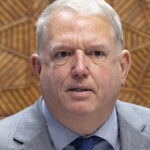By Curt Collier

The roots of Calvinism go deep in American culture. How this came to be is complex, but it is worth noting that even our secular culture was directly shaped by Calvinist ideas (and as a reaction to them), despite our belief that secularism is a move away from religiosity. By way of example, the notion of church and state separation was advanced by Puritan minister Roger Williams only 11 years after the landing at Plymouth in 1620. He was eventually kicked out of the Massachusetts Bay Colony and went on to found Providence Plantations, which became the Colony of Rhode Island. He advocated for religious freedom (in Providence is the oldest Jewish synagogue in the US) and a strict separation of church and state.
The antinomian controversy that racked the Puritan Churches of the Standing Order in 1638 (led by the remarkable Anne Hutchinson) pushed religion further from “secular” authority, and led to the hanging of Quaker Mary Dyer, another amazing woman, in 1660. Dyer further pushed a separation of church and state and the freedom of belief, a central theme of American identity. Statues of Hutchinson and Dyer now grace the Massachusetts State House.
Thoreau and Emerson elevated nature

By 1835, Unitarian ministers Ralph Waldo Emerson and Henry David Thoreau were already advocating for Nature being a better teacher of divinity than even the Church. Emerson’s book “Self Reliance,” written in 1841, promoted the notion that a rugged individualism, unconstrained by either church or state, captured the American imagination. The American Transcendentalist movement that he led played a major role in freeing the church’s grip on secular society. We often forget that what Emerson was promoting was simply a new form of religion, not its overall abolishment.
By 1919, however, Unitarian minister John Dietrich, born in 1875, advocated that real religion no longer even required a belief in God. Dietrich, often called the father of Religious Humanism, was by no means an outlier, as by this time other religious traditions had emerged that emphasized that religion did not need a belief in a deity, most notably our own Ethical Culture Movement.
Secular culture is an extension of religious ideas
I point out this history to suggest, as I often do, that our secular culture is often simply an extension of the religious ideas that shaped this nation, and not always to our advantage. American culture’s heavy focus on individualism, as opposed to a spirit of community, is one of the challenges facing us as a nation. The notion that no one can come between us and our own personal “salvation” goes back to the Reformation. In much of my writing and community work, I stress that divesting secular culture of an over-emphasis on these religious ideas would go far to improving social cohesion. At the Ethical Culture Society of Bergen County, I’m happy to see that the spirit of community, and communal responsibility to each other, is well in evidence.
For five Sundays starting Feb. 12, our Society will be holding a speaker series. We thought that focusing on one issue each year with a series of addresses would be a great way of thinking about an important issue from a variety of perspectives. This, hopefully, will better inform the actions that we take or the issues we support. Thanks to the team for pulling this together, especially Elaine Fondiller, chair of the Gathering Committee, who supported the effort, Theresa Forsman, who worked to get a grant from the Puffin Foundation, Terri Karp, who advanced the publicity materials, and Eric Sandhusen, Elaine, Terri, and Theresa for helping to get the info out there. Thanks also to Susan Lesh for handling the logistics and to David Bland for pulling in more team members to assist with the planning, and to Society members Anne Wallman, Gail Farber, and Theresa for providing donations of airfare miles and/or hotel points.
Who stands to lose if the wall fails?
Brian Silva will kick off the speaker series on Feb. 12. Silva, vice president of Outreach and Engagement at Americans United for Separation of Church and State, will be speaking on who stands to lose if the wall separating church and state fails. Silva has decades of experience fighting for marriage equality rights for LGBTQ+ couples and has extensive knowledge on how religion impacts the rights of people who want to participate in the communal, economic, and social benefits of marriage.
The following week Dan Barker takes the podium. A former Christian minister and Christian musician, Barker eventually moved away from that religion and is currently the co-president of the Freedom from Religion Foundation. Barker’s former work as a Christian evangelist makes him well suited to discuss what the breaches in the wall are truly about and what religious fundamentalists eventually hope to achieve. Using his musical talent, Barker is offering a Freethinkers Concert the night before to help raise money for our speaker series. Please attend and support the series with your entry donation.
We will hear from the ‘other side’
On February 26, our speakers are two young adults from the Freedom Forum, a conservative organization fighting for more public accommodation of religion, to provide an opportunity for the “other side” to give its perspective. Benjamin Marcus and Hannah Santos will share their viewpoints on the issue of church-state separation, the complexity of the disputes that drive it, and the diversity of those supporting it.
Next, on March 5, we have Jeremiah Camara, an author, blogger, and documentary film producer, who will help address the complexity of the issue for people of color. Historically, many civil rights movements have been intrinsically tied to religion and were grounded on religious themes. Think Reverend Martin Luther King Jr.’s work or Caesar Chaves’ advancement of the De Colores movement tied to Catholic liberation theology. How do progressive, non-theistic religious groups like the Ethical Culture movement, which support a strict separation of church and state, serve as allies to groups today, such as Reverend William Barber’s Poor People’s Campaign, which he also cast as a moral revival movement?
Film screening: ‘Contradiction: A Question of Faith’
Camara is also showing his film “Contradiction: A Question of Faith” on the Saturday evening before he speaks at the Society. I hope you can join us for that film, as your entry donation is another way to support the series.
Finally, former Nevada State Senator Lori Lipman Brown will be our closing speaker. Ms. Brown, who formerly taught US constitutional law at the University of Phoenix, has extensive experience advancing American secularism. She is the founding director of the Secular Coalition of America and has won extensive awards for her work from the ACLU, the National Education Association, and the National Association of Social Workers, among others, fighting for the rights of the LGBTQ community, advancing equity and diversity training, and other human-rights initiatives. She will provide us with a sobering account of the “devouring of the Establishment Clause” and what groups like the Bergen Society can do to help maintain the wall.
This is going to be a wonderful series, with lots of thought-provoking ideas. We need you to support the series by joining us on Sunday mornings and by attending the benefit concert and film. Come learn about an issue that will directly impact you and your family.
Curt Collier is leader of the Ethical Culture Society of Bergen County.
All details about our speaker series, Is the Separation of Church & State Coming to an End?


